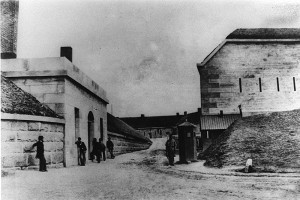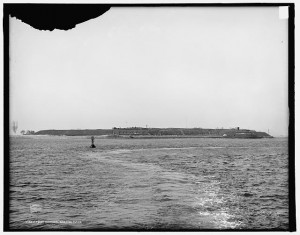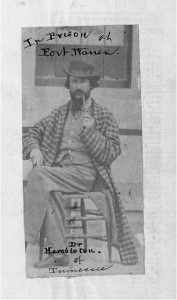150 years ago today the Richmond Daily Dispatch reprinted an article about the conditions at Fort Warren in Boston harbor. The fort was being used to house captured Confederate troops and political prisoners. As Civil War Daily Gazette recently reported James Mason and John Slidell, captured Confederate commissioners to Europe, had been delivered to Fort Warren on November 24th. Here’s part of the reprinted article in the Daily Dispatch describing conditions at the fort:
The Imprisoned in Fort Warren–their condition.
At present there are one hundred and twenty political prisoners, between fifty and sixty rebel officers and over six hundred prisoners of war confined in the fort. On Thursday last the number was increased by the arrival of two officers and twenty-five soldiers who were taken prisoners in the night attack on Santa Rosa Island. …
These men have considerable liberty allowed them, and a portion of the parade ground is set aside for their uses. Their cooks prepare their rations by camp fires located in close proximity to their quarters.–Most of them seem quite well contented with their treatment.
The political prisoners and the rebel army and navy officers are quartered in the rooms on the west side of the parade ground, intended for the garrison officers. These individuals have all subscribed to a parole of honor, in which they promise not to go upon the ramparts, converse with the sentinels, or make any attempt to communicate with the shore, in person or otherwise. Their privileges are ample, and no such restrictions are placed upon them as our brave fellows are subject to in Southern prisons. Among the prisoners are many officers lately connected with the army and navy of the United States. Before the arrival of the rebel ministers the following were the most prominent personages confined here: Ex-Minister to France Faulkner; ex-Governor Morehead, of Kentucky …
The scene of the parade ground during the day is quite animated and full of interest.–Men of all ranks and professions are here thrown together, all in a greater or less degree connected with the event which has attracted the attention of the whole world, and which has caused the blood of brothers to flow as water. A group of naval officers, recreant to their flag and their oath, may be seen pacing to and fro as if upon the deck of some noble vessel. Many of the groups are enjoying themselves in earnest conversation, while here and there may be seen little knots of persons, some rather indifferent, but yet you can almost see a lurking and revengeful fire in their eyes. As a general thing their personal appearance is not at all prepossessing. Seedy apparel is by no means uncommon, and if one did not know the character of the place he would be led to think that it was an asylum for broken down gentlemen. A clean shaven face is rarely to be met with
This is passed away by those unhappy mortals in playing games of chance. A large portion of the day is spent in this kind of amusement, and the entire evening is spent in the same way. At ten o’clock the lights are put out, and after that time nothing is heard save the sentinels’ regular call of “All’s well.”–They are allowed newspapers and to receive letters from their friends, but previous to their being delivered to them they are carefully read by officers of the garrison. I can not conclude the description of the personnel of the prisoners without remarking that the soldier prisoners are terribly annoyed with vermin, and, despite the efforts of the officers, the evil does not seem to diminish.
The quarters selected for the use of the rebel Commissioners are precisely the same as those occupied by the other political prisoners. This room is a few doors from Colonel Dimmick’s headquarters, in the same row, or, rather, under the same roof. The building is of beautiful New Hampshire granite, the roof forming the Tremain of the work. It has but one story above ground, which is divided into several fine and airy apartments. The basement contains all the necessaries for culinary operations, with quarters for servants &c. The largest rooms are about sixteen fact square, with high billings, and lighted by two large windows. A marble mantle adorns, the room, and a large grate furnishes the convenience for a good fire. The furniture of the room consists of a plain pine table, a few camp stools, the baggage of the occupants and a low wooden bedstead. A good straw mattress, with pillows of the same material, and heavy army blankets, make up the furniture of the room.–To say the least, the quarters are much better than they deserve. As to living, they can mess with their friends at the rate of one dollar per diem, having all the staple products of the market on the table.
If they are given to the use of the weed they can indulge that taste, for smoking is allowed, but liquors are prohibited. In fact, almost everything but liberty is granted to them. …



